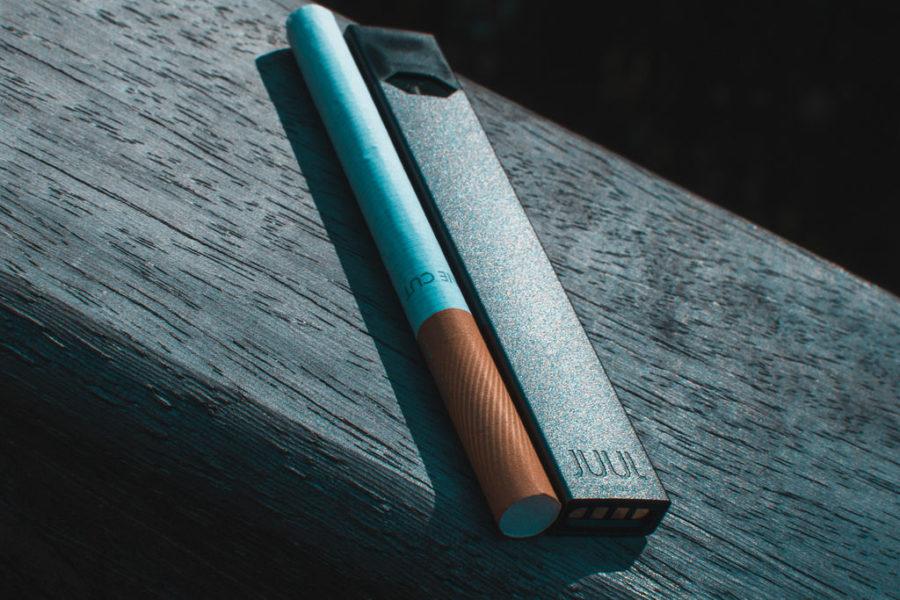Potential Juul ban will boost other vaping brands, retailers and customers say
Juuling is among the newest additions in the continuing trend of e-cigarette products being promoted as a healthier option than smoking actual cigarettes.
July 17, 2022
By Katherine Kealey, [email protected], story via Iowa Capital Dispatch
Even in the slow summer months in a college town, Aj’s Liquor in Ames sells roughly 160 Juul pods a week to customers between the ages of 21 to 24.
But convenience store shelves could be stripped of Juul products, depending on a decision by the U.S. Food and Drug Administration about the products’ safety.
Will Montgomery, sales representative for Aj’s Liquor, said customers are already transitioning to alternative brands for nicotine products as the FDA considers a marketing denial order against Juul. Even if the ban is successful, Montgomery said he doesn’t expect electronic nicotine delivery systems to decrease in sales.
“People are still going to need nicotine,” Montgomery said.
Federal action against Juul
The FDA issued a temporary stay on its proposed distribution ban for Juul Labs to allow for additional review. The stay does not mean the administration is rescinding the order.
On June 23, the FDA announced a marketing denial order against Juul, deeming the company presented insufficient information to determine potential health risks.
The following day, the U.S. Court of Appeals for the D.C. Circuit issued a temporary administrative stay on the marketing denial order. Juul Labs would have been required to stop selling and distributing Juul pods. Any businesses selling Juul products would have been forced to remove the products from their shelves or face enforcement action.
After the order, Juul Labs released a statement disagreeing with FDA’s finding and stating Juul products “meet the statutory standard of being appropriate for the protection of the public health.” Juul Labs Chief Regulatory Officer Joe Murillo said the company will explore appealing the decision and engaging with regulators.
“We remain committed to doing all in our power to continue serving the millions of American adult smokers who have successfully used our products to transition away from combustible cigarettes, which remain available on market shelves nationwide,” Murillo said.
Taylor Boland, director of communications for Kum & Go, said all Kum & Go stores ceased sales of all Juul products on June 23 but resumed sales following the federal court’s block.
“Kum & Go remains committed to selling age-restricted products responsibly and complying with local, state and federal laws, orders, and mandates,” Boland said in an email response to Iowa Capital Dispatch.
Who is using nicotine products
The marketing denial order does not extend to individual possession or use. The FDA does not intend to enforce a ban against individual use. While Juul markets its product as a resource to help smokers quit cigarettes, the FDA has limited sales of fruit and mint flavored cartridges for targeting minors.
Iowa has also taken steps to prevent adolescents from vaping. In 2019, Gov. Kim Reynolds raised the state minimum age to purchase tobacco and vapor products from 18 to 21. A 2018 study from the Division of Tobacco Use Prevention and Control found that e-cigarette use doubled from 2016 to 2018.
In 2021, 24% of 11th graders and 10% of eighth-graders tried some form of vape product, according to Iowa Youth Survey Report. The Division of Tobacco Use Prevention and Control works with local community partnerships to share information on all forms of tobacco including vaping devices.
The Iowa Department of Public Health proposed legislation in 2020 to extend Iowa’s Smokefree Air Act to include vaping — banning electronic cigarette use in public areas. The legislation was recommended by a Human Resources subcommittee in the Senate but it went no further.
Customers move to other brands
Montgomery said the majority of customers who buy Juuls aren’t using them to stop smoking. If they were, they’d buy lower-nicotine products, he said.
Payton Hartz started vaping at the age of 18 when his friend bought him a vape pen. Before then, he had never smoked. Hartz switched over Juul when he was 19 because of how convenient the products were. After Juul limited their flavors, Hartz transitioned to an alternative disposable vape brand.
The potential ban has “opened the door for other companies to push to the front,” Hartz said. “I feel like the throw-away vapes hadn’t existed until the Juul really came around. I feel like with the laws, all it has really done is push more companies to be even with Juul.”
Retailer voluntarily avoids Juul
Juul products aren’t for sale at Central Iowa Vapors because they want to avoid selling customers products with diacetyl and other harmful ingredients, sales associate Gavin Watts said. If a product doesn’t comply with the FDA’s regulations, Central Iowa Vapors takes it off the shelves, Watts said.
“Basically, we don’t want to carry any product that has harmful effects on customers … to give customers an alternative way to vape without any of the health defects,” Watts said.
Watts said roughly 75% of customers are vaping to quit cigarettes and about half those consumers are between the ages of 21 to 24. After the age to buy tobacco products increased, Watts said the store had to ramp up identification checks due to underage customers still attempting to buy nicotine products.
“The biggest issue with it is people who are underage are getting it and then causing a problem,” Watts said. “Because in high school or middle school, it is like a cancerous spread. We feel it our responsibility to make sure that doesn’t happen at least on our behalf.”
This article was originally published by the Iowa Capital Dispatch. Iowa Capital Dispatch is part of States Newsroom, a network of news bureaus supported by grants and a coalition of donors as a 501c(3) public charity. Iowa Capital Dispatch maintains editorial independence. Contact Editor Kathie Obradovich for questions: [email protected]. Follow Iowa Capital Dispatch on Facebook and Twitter.







